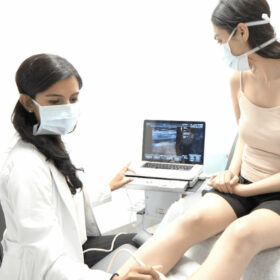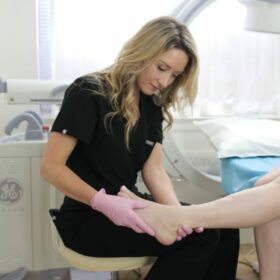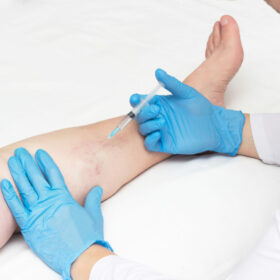How do you treat venous insufficiency in the legs?
Venous insufficiency in the legs, also known as chronic venous insufficiency, is a common health issue that causes a range of symptoms, including leg swelling, fatigue, leg pain, restless leg syndrome, leg heaviness, frequent leg cramps, spider veins, and varicose veins. It occurs when the veins in the legs cannot effectively return deoxygenated blood to the heart. Fortunately, several treatment methods have been proven to help reduce symptoms and prevent further deterioration.
The first step in treating venous insufficiency in the legs is to make lifestyle changes. Wearing compression stockings is a great way to reduce swelling and promote circulation. Elevating the legs throughout the day can also help relieve pressure in the veins and prevent further blood pooling. Regular physical activity is also beneficial as it helps strengthen the veins and improve blood flow. Some of the best exercises for chronic venous insufficiency include running, swimming, cycling, and yoga.
However, lifestyle changes can’t treat the root cause of chronic venous insufficiency — the damaged vein valves that allow blood to accumulate in the leg veins. The only way to treat CVI is with minimally invasive procedures, such as radiofrequency ablation, endovenous laser ablation, venaseal, and ambulatory phlebectomy. Your vein doctor must diagnose and treat the root cause of chronic venous insufficiency to improve your symptoms and prevent a recurrence. Minimally invasive vein treatments are safe, painless, and usually covered by insurance.
These are just a few of the ways that venous insufficiency in the legs can be treated. It is always best to consult a vein doctor before beginning any treatment, as not all treatments will suit everyone. With the help of lifestyle changes and minimally invasive vein treatments, you can reduce your symptoms and treat chronic venous insufficiency.
Should I get my varicose veins treated?
Are you considering getting treatment for your varicose veins? Varicose veins can be uncomfortable and leave you embarrassed by the visible appearance of bulging, twisted, and discolored veins on your legs, ankles, or feet. Most people opt for varicose vein treatments for cosmetic reasons, but you also need varicose vein treatments for medical purposes. Below, we describe the factors to consider for varicose vein treatments.
First, you should consider the symptoms associated with your varicose veins. While some people experience no symptoms, others experience pain, aching, throbbing, burning, or swelling. For some people, varicose veins can cause fatigue, heavy legs, and skin discoloration or ulcers around the ankles. If you’re experiencing any of these symptoms, you need prompt treatment.
If your varicose veins are located in a more visible area, and you’re self-conscious of their appearance, then treatment can improve your self-confidence. Patients with varicose veins often avoid going to the beach or other social events because they don’t want their veins to become visible. As such, varicose vein treatments can restore your beautiful legs and make you feel confident about showing off your legs again!
Most importantly, you must undergo varicose vein treatments because varicose veins are usually symptomatic of chronic venous insufficiency, a dangerous circulatory disorder. CVI is a medical condition where the collapse of vein valves leads to backward blood circulation and the accumulation of blood in leg veins. Over time, as blood accumulates, you may develop skin discoloration, leg ulcers, and deep vein thrombosis, so treatment is essential.
Your vein doctor must administer duplex ultrasound and other imaging tests to visualize the root cause of your vein problems and curate a personalized treatment plan.
Do varicose veins cause high blood pressure?
Varicose veins are swollen, bulging, or enlarged veins, and while they don’t directly cause high blood pressure, they can be associated with two circulatory problems that can lead to high blood pressure. People with varicose veins may be more likely to suffer from chronic venous insufficiency, a disorder in which the veins don’t circulate blood properly, and deep vein thrombosis, a blood clot that can block blood flow. Managing conditions like these can help reduce any high blood pressure risk.
When should I contact a doctor to remove varicose veins?
In most cases, you should contact a doctor if you’re experiencing any of the following: noticeable swelling or heaviness in your legs, aching or itching in the affected area, discolored or sensitive skin around the veins, or if your skin is ulcerating due to the varicose veins. See a doctor if you have a family history of venous disease or if you’re at increased risk of vein disease because of obesity or pregnancy.
If you’re experiencing discomfort or any of the risk factors mentioned, it’s best to consult a vein doctor to evaluate your varicose veins. A vein doctor can check for associated medical conditions and review various treatment options based on your situation. Treatment options vary from wearing compression stockings to minimally invasive vein treatments, such as endovenous laser ablation, sclerotherapy, and ambulatory phlebectomy.
Vein Treatment Clinic is a group of state-of-the-art vein clinics led by board-certified, highly-skilled vein doctors. Our vein doctors always diagnose the root cause of your vein problems, curate a personalized treatment plan, and help you implement lifestyle changes that minimize the risk of vein disease recurrence. You can find our vein doctors in New York City, New Jersey, Long Island, California, and Maryland.
You can find our vein centers in San Diego and San Jose if you’re in California. Please schedule an appointment at the best clinic for varicose veins today.











